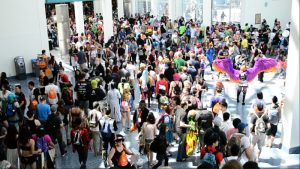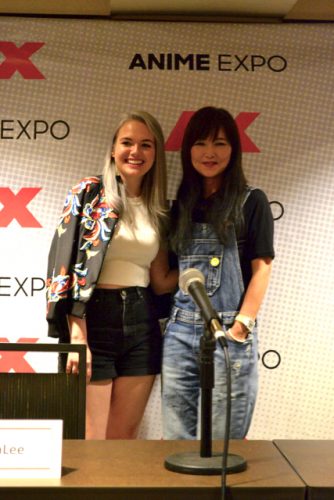
Another couple of stars we got to spend time with at Anime Expo 2017, were YouTuber AmaLee (LeeandLie on YouTube), and voice of Super Dimension Fortress Macross’ Lynn Minmay, Mari Iijima. Considering their complete opposite backgrounds, this was a very interesting session with the singers/voice actresses!
Q1. How did the two of you get involved with voicing animation?
AmaLee: So, I started out online on indie games and stuff, and then here [Anime Expo], in 2011, I won a voice acting competition that Bang Zoom did. And then from there, I slowly was in good parts. Slowly getting more parts I guess!
Iijima: I was always a musician, and I was a piano student. Also, I was writing many, many songs on my own. By the time I was in high school I had many songs, so I sent some demo tapes out. And, somehow, JVC Victor in Japan found my tape and I got signed with them as a singer-songwriter. At the same time, they were looking for somebody to play Lynn Minmay for Macross. And the soundtrack of Macross was released by the same record company but a different section. So since I’d just signed as an artist, they sent me to the audition. I didn’t know anything about animation. I didn’t aim for that, but somehow, there were another two actresses at the audition, I think it was the last audition, actually. And I sang my own songs and read a few lines, and a week later they called me. I was Minmay! And that’s it. Different stories!
Q2. Was it always a dream to become a voice actress?
AmaLee: I always wanted to be a singer. And the voice acting was always so much fun, and it was kind of really similar. With songs, you kind of take a character and all the emotions and stuff… Voice acting is kind of a hobby, but I really love it.
Iijima: I guess when I was a child, I always loved Snoopy. And I was talking to the Snoopy dog like [in high pitched voice] ‘Oh hi..’ so I was doing the voice thing when I was a child, but I never thought that I would be an anime voice actress. And Minmay is the only character I’ve played. [to AmaLee] So I’m not like you! You are more professional!
Q3. What are some differences in voice acting between Japan and the US?
Iijima: Voice acting at that time, and I think we were a little bit famous for that, pictures were usually late. So sometimes we only saw a line as the timing for our line. So we acted without any pictures. Sometimes. A lot of times.
AmaLee: We get the full picture. And sometimes the translation will be a couple of words but the mouth will go on forever. And we’re like ‘oh no! Now we have to fill this huge space with words that don’t exist!’. But yeah, you have to match it perfectly. And I was recently on a show that I can’t talk about yet. But my character had really crazy vocal animation, where she would speak and then stop, and speak and then stop, and I had to match it but make it sound like a fluid sentence and it was horrible!
Iijima: Actually, I understand. I reprised the Minmay role in 2006 for ADV films and I did the whole 36 episodes in English. So I did it both in Japanese and English. So I understand because sometimes it takes a lot of space to say one thing in Japanese and in English you can say it quick. So, we had to, of course, add some dialogue and rewrite sometimes while I was recording Minmay in 2006. And, of course, I heard that I think anime fans here are more critical of the matching voice and mouth thing, so I was a little bit intimidated by that pressure, but I tried my best.
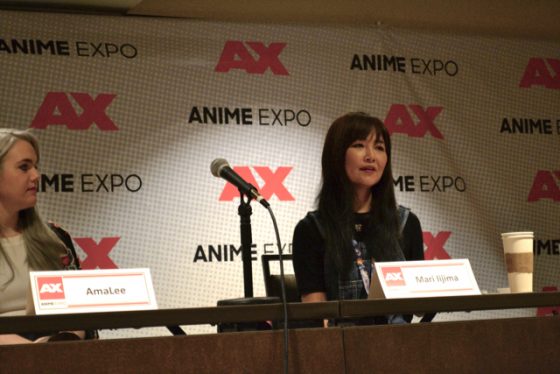
Q4. AmaLee, as an anime fan, are there things you didn’t like about dubbed anime voices that you make sure you avoid now?
AmaLee: I feel like now, doing those high, squeaky voices that usually are in the Japanese version, the dubs won’t do that. They’ll be like ‘No, we want more realistic voices. It sounds too fake’. [laughs] It sounds adorable in Japanese, don’t get me wrong! But us trying to mimic it comes off really strange. So they’ll just say ‘just try to make it more normal, maybe a little higher pitch’ but you probably won’t really hear those squeaky voices anymore in dubs. But yeah, there is a huge dub vs. sub war that will forever reign.
Iijima: It’s interesting because I got interviewed a few minutes ago and I was just talking about it. When I did the American version of Marcross, the director already knew what Macross was and he also watched Robotech. So he already had his own image for the TV series. Of course, he’s an animation director, so like that cute voice you’re talking about, I think I felt that he wanted to make me a little bit toward that direction. Like very cute, high voice. But, I’m the original Minmay, and when I did the original Macross, I ended up doing the work, but I wasn’t an anime actor, so my voice acting was very natural. So I didn’t want to change her. I didn’t want to suddenly make my Minmay a very anime-like character. So that was a little battle in the studio. My shoulder was really tight because I tried to protect Minmay.
Q5. Is there something you’ve always wanted to be involved with in your careers?
AmaLee: I’ve always acted professionally, and done covers on my YouTube channel. And while they’re licensed, they’re not the dub’s version. And I’d love the opportunity to sing for an official dub. Or, I know that, recently, a lot of anime has been using English singers in the Japanese version, and that would be a dream of mine, being in the official Japanese version! I mean it’s a very high dream, but one day!
Q6. Terra Battle has been collaborating with Final Fantasy and Square Enix. Is there any chance that you will return to the franchise?
AmaLee: Why don’t you ask Square Enix right now? [laughs] I want to keep on doing new things. So the chances are highly unlikely, but they say ‘never say never’, so I’ll just leave it at that.
Iijima: I’ve done many things. My love for life is ballet. I actually dance in front of my audience in Tokyo every year. So in that sense, I made that dream come true too, I was always a dancer. But I think now, I had a turning point in my life, when I lost my bunny in 2014. It was such a traumatic loss and I was so sad. But through that sadness and suffering, I found something very important. So I’m planning to write a book. Because after he passed away, I struggled. And the one who supported me through my sadness was himself, Bunny! You might think I’m crazy, but he sent me messages and I documented everything. So I can actually make a book for people who lost somebody very close and they think they can never see that persona again. Maybe we can’t touch them, but that person is still there, so I want to appease them.
Q7. If there was a chance to make it into an anime, would you do it? And voicing someone, maybe?
Iijima: Ooh! That sounds great! Yes! Maybe, a children’s book and an animation. I’ll think about that!
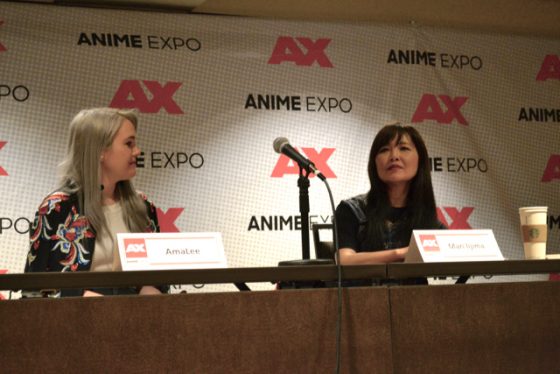
Q8. What is the biggest difference between the Japanese music industry and the American music industry?
Iijima: I don’t want to criticize them, but when I lived there [Japan], or when I go back there for a week or a few days for my work, and I listen to the radio, sometimes it’s hard to take because… I know you guys like Japanese music. Very hyper, energetic, J-Pop music. But for me, because I do love American Rock music, British Rock, and Pop music like Fleetwood Mac, Elton John, Hall & Oates, Oasis; sometimes I feel like ‘where is the real soul in the music?’ when I listen to Japanese radio. But sometimes I find ‘Oh, this person is so real!’. Once in a while, I find somebody in Japan also like ‘Oh, he’s the real deal’. So it’s not like there are none. There are some people, and we feel it.
But the biggest thing is, I think, in Japan is the Japanese Idol singer culture. I think Japanese guys, basically love virgins. The image of virgins. So, I think they are more told to be innocent than sexy. That’s the biggest difference. Because here, guys can handle sexy women. [laughs]
Over there, innocence and virginity are the most important. Not everybody, but in that industry. So that’s a huge difference. So for them being so skinny is great, but here, we need some boobs and butts. I think that’s a great thing, more individuality is here.
AmaLee: I agree. I think the markets are just so completely different. Especially the mainstream American market is so hard to break into. Even what I do, it’s such a niche market, but even tapping into that is very difficult. I’m working on original music now, but I know it’s going to be incredibly difficult to broaden out of my niche market. That’s what I’m most worried about.
Iijima: But nowadays it’s different from the 90s, we don’t need a huge record company. It’s good to have it! I had some, and they gave me some huge budget to create one album, and when I think look back I think ‘Wow! I got that much money and made one album? Wow!’. But, I don’t dislike the now, either. Although I do have to create my own budget, and I think, actually, I was one of the first people who started to release online, as a Japanese artist. So, that’s more strength, more control.
AmaLee: Yeah, solo is so much better than being harnessed by a label. Because I hear all these horror stories that they sign these contracts and they have to do all these things they don’t want to do, and they’re stuck in it. I like the freedom, honestly.
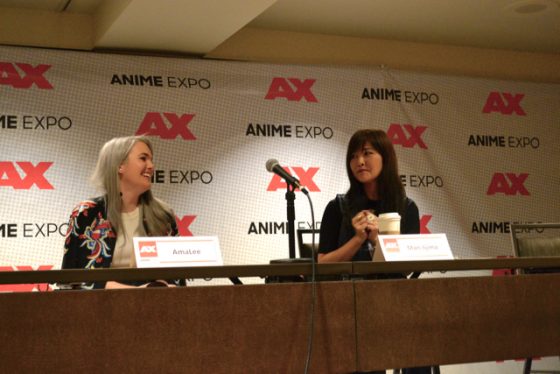
Q9. AmaLee, you have 970,000+ subscribers on YouTube. What were some struggles you had to face as an early content creator?
AmaLee: The struggles were figuring out if that was what I wanted to do. I only realized I wanted to do YouTube when I was halfway through my college semester. I was a sophmore and I took a year off because I was an English major, but I wondered, ‘I don’t know if I want to keep doing this degree. Maybe I’ll do this music thing. It’s kind of looking up!’. But I was still trying to figure it out and I didn’t have anyone helping me. So I planned just on learning from mistakes and trying new things and getting pointers from other YouTubers.
After I took that year off, I was like ‘I could do this! I don’t want to do English! I don’t want to be a teacher, that’s horrible!’ I want to do what I love as my full-time job. So that was the dilemma.
Q10. AmaLee, what was your process for adapting the song “aLIEz” (Aldnoah.Zero). It feels very similar but yet has a distinctive sound. Do you aim to emulate? Or to have your own unique style?
AmaLee: Well, this is a great example, because the translation for aLIEz is gibberish. The lyrics don’t make sense. So when I got to adapting it I thought, oh no, do I go more traditional? Do I just copy it even though it doesn’t make sense? Or do I adapt it for an American audience? Well, if I’d never heard this song in Japanese before and didn’t speak Japanese and heard this song in English and it was gibberish, it really wouldn’t make sense and I probably wouldn’t enjoy it. So I went more towards adapting it to an American audience if it’s going to be English-speaking people that are going to listen to it. So that’s what I usually do if things don’t make sense. I do really try to stick to the emotion. I’ll read through the song, I’ll know the character’s story, this is the voice the artist has, these are important key points, but I will change certain thing to make i t flow better so that an English-speaking person who doesn’t understand Japanese will understand it.
Do you have a message for the fans?
AmaLee: Thank you for having me! It’s been awesome. I do perform on Sunday at the comedy show, so I’d love for people to come out and see that.
Iijima: And my performance is tomorrow after the opening ceremony and I’m a little worried if many people will be here because it starts tomorrow. But, no matter what, as always, I’ll try my best to please the audience, so please come!
Final thoughts
It was fun and interesting to see two such opposite sides of the same industry thanks to these lovely women.
Were you lucky enough to see Mari Iijima or AmaLee perform at AX? Do you prefer Ms Iijima’s English dub over the original English dub? Were you already an AmaLee subscriber? What’s your favorite cover of hers? We hope you enjoyed this peek into our time with these amazing talented voice actress and singers!
Check out Honey’s for for reports from AX 2017!
Recommended Post


